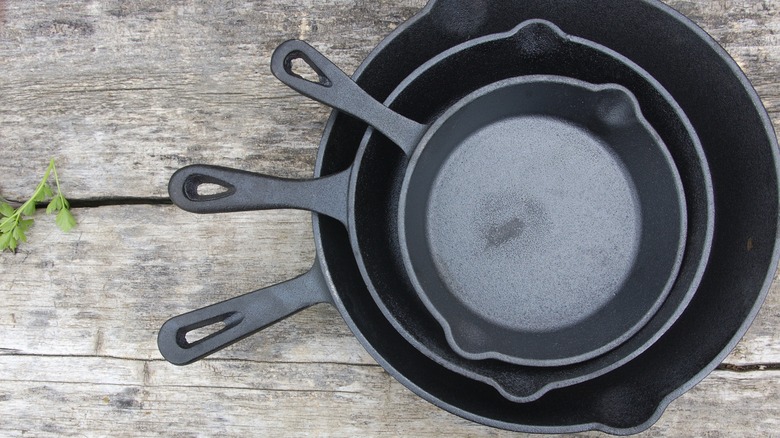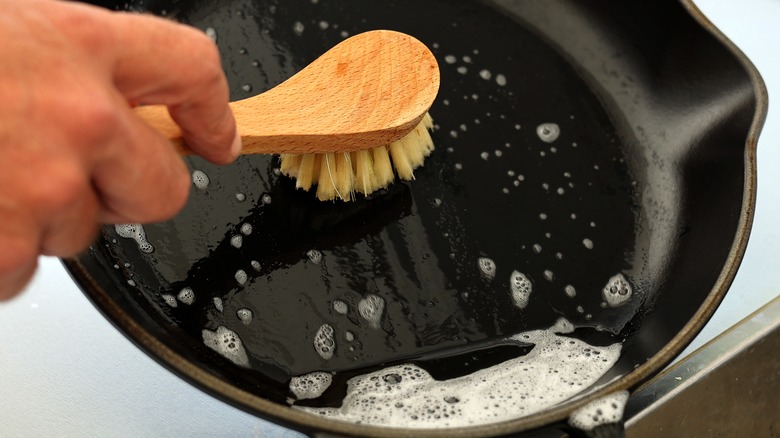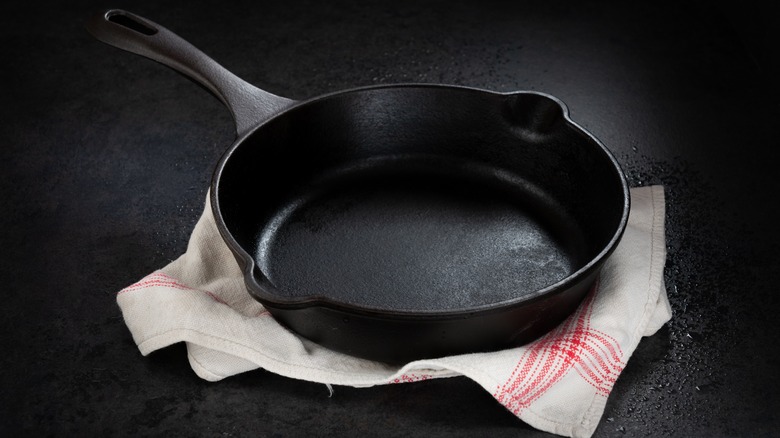The Cleaning Mistakes That Are Ruining Your Cast Iron Pans
Investing in a good cast iron skillet can bring about many good home-cooked meals. Unlike other regular frying pans, the thick iron surface is often thought to last a lifetime, and while it's true that cast iron skillets are created to withstand years and even decades of use, they require careful handling to make them last. Some common cleaning mistakes can damage your skillet, including soaking it in water, air drying, and placing it in the dishwasher.
Learning how to care for your cast iron pan can prolong its lifespan. Of course, before you ever use it, you must season it correctly to protect it and ensure that it will last long and clean well. Keep in mind, some pans do come pre-seasoned so make sure to check that first. To season your cast iron skillet, first wash it thoroughly with warm, soapy water, dry it completely, and then apply a very thin layer of high smoke point oil like canola or vegetable oil to the entire pan. Preheat your oven to 400°F, place the pan upside down on a foil-lined baking sheet, and bake for 1 hour. Let the pan cool completely in the oven. For a stronger seasoning, you can repeat this process two or three more times, allowing the pan to cool between each application.
Don't ever soak a cast iron skillet
Despite essential seasoning, cleaning cast iron improperly can lead to rust and ruin. To prevent rust on your cast iron cookware, you must be mindful when you clean them. Leaving your cast iron skillet submerged in water is a recipe for disaster. Prolonged exposure to soapy water breaks down the seasoned layer, leaving the bare iron vulnerable to rust. This compromises the skillet's non-stick properties and can discolor the surface. When heated, cast iron expands slightly, and soaking fills microscopic gaps with water, which expands further, causing the seasoning to crack and flake off.
Additionally, stagnant water creates the perfect environment for rust to form. Instead of soaking, clean your cast iron skillet immediately after use while it's still warm to encourage food residue to loosen easily. Rinse the skillet under warm running water, scrubbing gently with a soft brush. Use a small amount of mild dish soap, and rinse thoroughly.
Putting your cast iron skillet in the dishwasher is another invitation to rust. The harsh detergents and high wash temperatures in dishwashers are highly detrimental to the seasoning and can strip away the protective layer. Additionally, the forceful jets of water can dislodge and damage the seasoning. Though hand washing may seem like an extra step, it is the best way to keep your cast iron in good condition which enables it to last long.
Do not air dry your cast iron pan
Though it may not seem like it would be a problem, leaving your cast iron to air dry after washing is another big risk. Since a cast iron skillet is porous, it has tiny holes that can trap water. Even a pan that looks basically dry may have microscopic water droplets clinging to its surface. This is because even seemingly dry surfaces can harbor tiny pockets of moisture, especially in the nooks and crannies of the pan. As these droplets evaporate, they leave behind dissolved minerals which contribute to rust formation.
Rather than allowing the skillet to air dry, after rinsing and scrubbing your cast iron, dry it thoroughly with a clean, lint-free cloth. You can also use a paper towel after that for a further final touch. Another option is to place the pan over low heat on the stovetop for a few minutes. This helps ensure complete drying and eliminates any remaining moisture.


